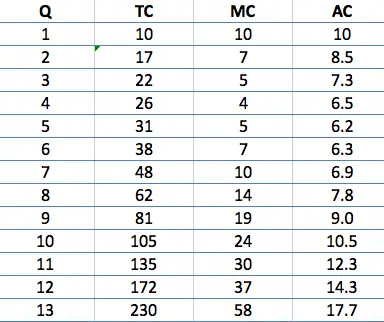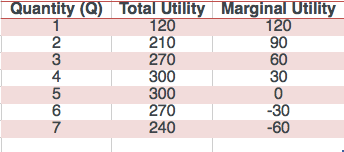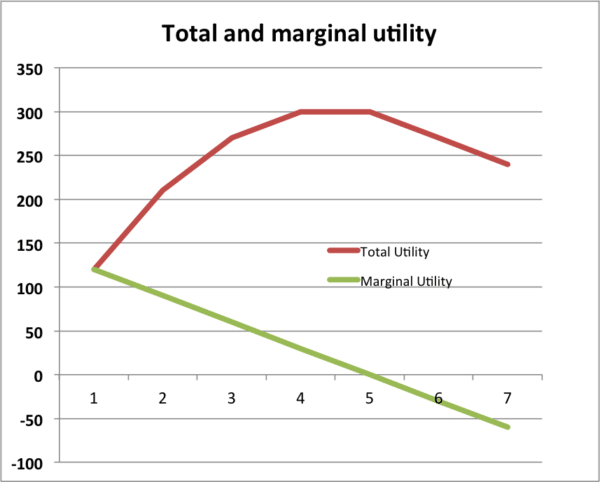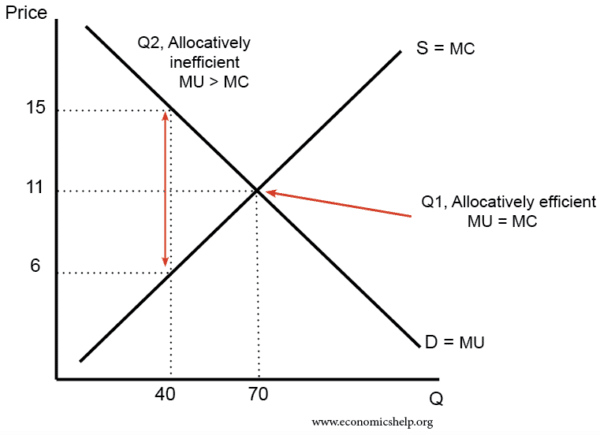In economics, marginal analysis means we look at the last unit of consumption/cost.
It gives a different picture to the total cost.
For example, the total cost of flying a plane from London to New York will be several thousand Pounds. However, with a plane 50% full, the cost of carrying one extra passenger is quite low. Therefore, the marginal cost of carrying the 102nd passenger is very low compared to the total overall cost.
Mar
Definition Marginal Cost
– Marginal Cost (MC) is the cost of producing the last unit of a good. (It is the difference in total cost (TC) between Qn and Qn-1)
- If the firm produces three units of output, the total cost (TC) = 22.
- To produce the fourth unit of output, the total cost (TC) rises to 26. Therefore, the marginal cost of this fourth unit is just 4.
- However, if the firm is producing 12 units. The marginal cost of producing the 13th good is 58 (230-172)
- The average cost of producing 13 goods is 17.7
- The Marginal cost is always the increase in total cost from last unit
Diagram of Marginal Cost
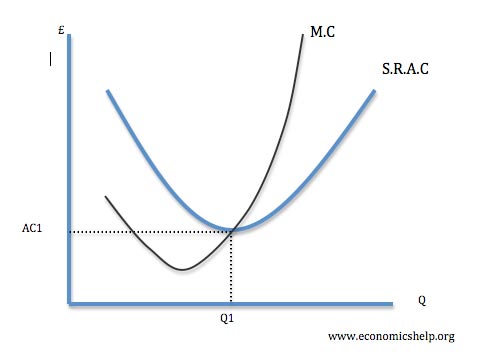
Marginal Utility
Definition of Marginal Utility The utility gained from consuming the last unit of a good.
- For example, if you consume one cake, your marginal utility may be quite high – say 120 units of satisfaction
- If you consume a second cake (in same day) your marginal utility of the second cake is likely to fall quite a bit to say +90
- If you consume six cakes, you may even start to feel ill and get negative utility from the sixth cake.
- Note: Even if you may really like cake, your marginal utility will soon fall for extra units.
- see: Marginal Utility Theory
Marginal utility and total utility
Importance of Marginal Analysis
Maximise utility
Why do you spend £1,000 on a diamond and £0.10 on a glass of tap water?
Well, one reason is that your marginal utility of your first diamond is high. But, your marginal utility for diamonds would soon fall.
With water, you will consume much more over your lifetime, because you need it every day.
2. No use Crying Over Spilled Milk
If you buy Christmas Trees for £5, does it make sense to sell them for £1?
Well, it can do.
Once you have bought Christmas trees, you have spent all your money. The marginal cost of selling trees is then very low.
If you have unsold trees on Christmas Eve, it is better to sell for £1, than to have unsold stock which costs money to destroy in the New Year.
For an airline, the marginal cost of selling an extra seat on a plane is very low. Most costs of flying are fixed. Therefore, once the plane is scheduled to fly, the marginal cost of an extra passenger is very low, so it makes sense to fill the plane up as much as possible.
Allocative efficiency
We say allocative efficiency occurs at an output where the marginal utility of consumption equals the marginal cost. At this point society is maximising welfare.
Why is this?
Suppose, we have a good where only 40 units are consumed. But, at this output the marginal utility (15) is much greater than marginal cost (6)
Society would benefit from increasing output – because the utility gained will be greater than the cost.
The optimal result would be to increase output to 70 – where marginal cost = marginal utility
Related

